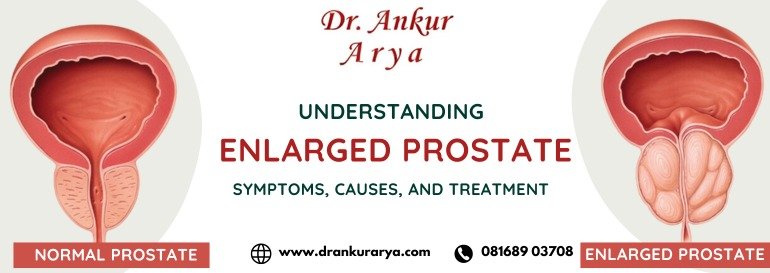Understanding Enlarged Prostate: Symptoms, Causes & Treatments
If you're looking for expert care for prostate health, consult the best urologist in Paschim Vihar for personalized treatment and advice.
The prostate is a small, walnut-shaped gland in men, critical to the reproductive system. As men age, this gland can grow larger, resulting in a condition called Benign Prostatic Hyperplasia (BPH), or enlarged prostate. While common, BPH can significantly impact comfort and daily life. Let’s delve into its symptoms, causes, and available treatments.
Symptoms of an Enlarged Prostate
An enlarged prostate can press on the urethra, leading to urinary difficulties. Common symptoms include:
- Frequent urination: Experiencing the urge to urinate often, especially during the night (nocturia).
- Difficulty starting urination: Struggling with a weak or interrupted urine flow.
- Incomplete bladder emptying: Feeling as though your bladder isn't fully emptied.
- Urgent need to urinate: Experiencing sudden, strong urges to urinate.
- Dribbling at the end of urination: Inability to completely stop the flow of urine.
If you notice these symptoms, consulting a urologist in Paschim Vihar can help ensure proper diagnosis and care.
Causes of an Enlarged Prostate
The precise cause of prostate enlargement is not entirely understood, but certain factors are known to contribute:
- Age: BPH is most prevalent in men over 50.
- Hormonal changes: Shifts in testosterone and estrogen levels can trigger prostate growth.
- Family history: Genetic predisposition may increase the likelihood of developing BPH.
- Lifestyle factors: Obesity, inactivity, and poor dietary habits can exacerbate symptoms.
Treatment Options for an Enlarged Prostate
Managing BPH involves a range of treatment options, tailored to the severity of symptoms:
1. Lifestyle Changes
- Reduce intake of caffeine and alcohol to avoid bladder irritation.
- Maintain a healthy weight and stay physically active.
- Avoid drinking fluids near bedtime to limit nighttime urination.
2. Medications
- Alpha-blockers: Relax the muscles around the prostate and bladder, improving urine flow.
- 5-alpha reductase inhibitors: Gradually shrink the prostate gland.
3. Minimally Invasive Procedures
- Procedures like transurethral resection of the prostate (TURP) or laser therapy offer relief for severe symptoms.
4. Surgery
- For advanced cases, surgical removal of parts of the prostate may be necessary.
When to See a Urologist
If BPH symptoms disrupt your daily life or lead to complications like urinary tract infections, kidney issues, or bladder stones, it’s vital to seek help from a urologist in Paschim Vihar. Early diagnosis and intervention can prevent further complications and improve overall well-being.
